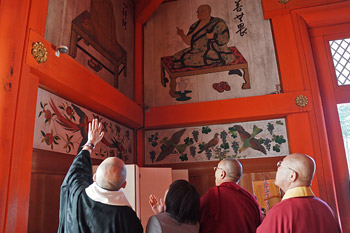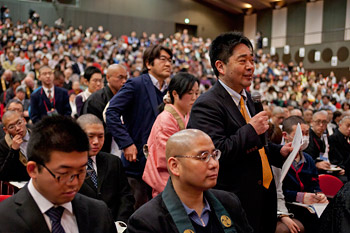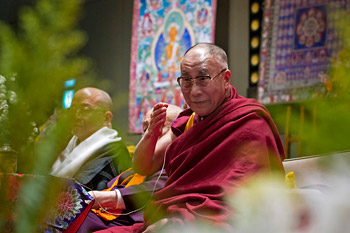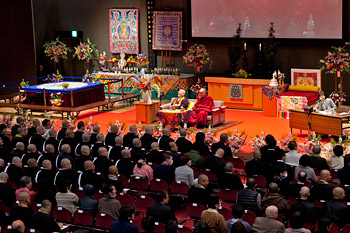Public Talk in Koyasan before Departure for Tokyo
16/04/2014 10:59 (GMT+7) Font size:  
Koyasan, Japan, 15 April 2014 - Once more Koyasan was bathed in bright sunshine as His Holiness the Dalai Lama paid a visit to the Daito Stupa. It stands in the Danjo Garan, an area of Koyasan established by Kobo Daishi for training in the practice of esoteric Buddhism. He visited one of the adjacent halls which contain colossal statues related to Vairochana and admired paintings of Kobo Daishi and Nagarjuna high on the walls. 
| His Holiness the Dalai Lama admires the wall paintings inside Daito Stupa in Koyasan, Japan on April 15, 2014. Photo/Jeremy Russell/OHHDL
|
In the Koyasan University Auditorium a capacity crowd of 800 were again awaiting him and he lost no time sitting down to talk to them.
“Respected Abbot, spiritual brothers and sisters, I am very happy to have this opportunity to interact with you. I am grateful to Koyasan Monastery for organizing the teachings and this occasion. I enjoy being here. It’s quiet and peaceful. The only problem is the cold, since traditional Japanese buildings are designed for warmer weather. Now, the other day there wasn’t time for any questions, so perhaps you’d like to ask some questions to begin with.”
The first prepared question from members of the University was, ‘What does prayer mean to you?’ and His Holiness replied that prayer is common to all religious traditions. However, Buddhists, Jains and Samkhyas have no concept of a creator god. The Buddha told his followers, ‘You are your own master; your pain and pleasure are in your own hands.’ He added:
The Buddhas do not wash away the karma of other beings,
Nor do they remove the consequences with their hands;
They do not transmit their understanding into others' minds;
They introduce beings to freedom by educating them about reality.
When Buddhists take refuge in the Buddha, Dharma and Sangha, it is developing the Dharma in their own minds that is the actual refuge; the Buddha is the teacher and the Sangha are companions on the path. We need to study, which involves listening and reading, reflection and meditation. The Buddha is like a physician, the Dharma is like the treatment, while the Sangha is like the supportive nurses. When we are ill, we need to consult a doctor, but it is not sufficient for him to prescribe a treatment, we have to follow his advice and take the medicine.

| Audience members line up to ask His Holiness the Dalai Lama questions during his talk at Koyasan University Auditorium in Koyasan, Japan on April 15, 2014. Photo/Office of Tibet, Japan
|
A second question concerned what His Holiness considers most important as a Buddhist monk. He unhesitatingly replied:
“The three trainings: the morality, concentration and wisdom presented in the Vinaya, Sutras and Abhidharma. Morality includes the individual liberation precepts common to all Buddhist vehicles in addition to the precepts of bodhisattvas and the tantras. The practice of tantra combines calm abiding with wisdom.
“Every day I get up at 3am and say prayers and do analytical meditation. As a bhikshu, I don’t eat after lunch and I go to bed by 8pm and sleep well. When I dream, I dream about what I’ve been thinking about during the day, mostly reflecting on bodhichitta and emptiness, so my analysis goes on even in my dreams. Of course, in tantra the dream state is also an opportunity to meditate on the clear light. “
Asked for his impressions of Koyasan, His Holiness expressed his appreciation for its peace and quiet, commending it as a place to do meditation. He then opted to talk more generally and said he would invite further questions at the end if there was time.
“Wherever I go the organizers of my meetings arrange a public talk, because I have a great interest in meeting the public. Why? Because everyone wants to lead a happy life, even animals and birds. No one wants suffering and pain. We don’t need to prove this. However, we human beings are different from other sentient beings because having this marvellous intelligence; we have greater potential. We are all just human beings, mentally, physically and emotionally we are the same. We all want to live a happy life.
“These days there are many modern developments and Japanese too pay more attention to the value of material things than to inner values. As a result we face a lot of problems, many of which we have created ourselves. Modern people pay more attention to satisfaction on a sensory level. We like things that look good. We derive satisfaction from looking at and listening to pleasing, beautiful things. Similarly, we get pleasure from things that smell, taste and feel good, including sex. Animals have sensory experiences like this too, but because we also have this marvellous brain and intelligence, we have much more experience on a mental level.”

| His Holiness the Dalai Lama during his talk at Koyasan University Auditorium in Koyasan, Japan on April 15, 2014. Photo/Office of Tibet, Japan
|
His Holiness explained that our mental experience is also more varied; we have stress, worry and pain. Sensory experience does not offset the intense pain or pleasure we feel on a mental level, it may distract us, but it doesn’t overcome it. On the other hand, if we have a stable sense of peace of mind, even negative experiences will not be very upsetting. He added that peace of mind is also beneficial for our physical health and that medical experts have found that anger, hatred and fear eat into our immune system. Being calm and relaxed is better for our physical well-being. Laughing, he mentioned that he often teases young people for the emphasis they place on their physical appearance when what is more important is inner beauty - compassion, affection and respect. He said that a marriage based on inner beauty is much more likely to be happy and lasting than one based only on good looks.
“Modern life, even the education system, is based on the value of material things and a culture of materialism. Discussions with thinkers and educationists suggest that our education system needs to be more involved with ethics, irrespective of faith or a lack of faith. As human beings we need ethical values. In the USA in particular we are developing a project to introduce secular ethics into education. Results so far have been encouraging. We have to think of the welfare of 7 billion human beings because we are part of them. An example of this interdependence is the relation of the Japanese economy to the rest of the world.
“The question of the environment and climate change are a global issue too, not just of concern to Europe, Asia, Africa or the Americas. We should think of everyone not just me or us. What happens on this one blue planet where we live affects us all. We need to take the benefit of the whole of humanity into account, rather than thinking of ‘us’ and ‘them’, which becomes the basis for dividing people into friends and enemies and the prospect of war. We need to deal with the injustice in the world; the gap between rich and poor which sees the poor dismissed as almost of no importance. And responsibility lies with us 7 billion human beings, not on the shoulders of the Buddha, Jesus, Mohammed or Krishna. When I attended a gathering to pray for world peace in Hiroshima some years ago, I said that world peace will not come about by merely praying for it, we have to take action. And I believe taking action is something Japanese understand. So, that’s what I have to say, thank you.”

| A view of the stage at Koyasan University Auditorium, venue for His Holiness the Dalai Lamam's talk in Koyasan, Japan on April 15, 2014. Photo/Office of Tibet, Japan
|
His Holiness then answered several questions from the audience. Asked why people tell lies, he said that lying is short sighted and narrow minded. We all need friendship, which is built on trust, honesty and truthfulness, the basis of a happy community. When a woman asked about the use of sexual energy in tantra His Holiness warned that we should not misunderstand the paintings of deities in union with consorts. He mentioned that he has also heard of lamas using such misunderstandings as an excuse for sex, which is entirely wrong.
A questioner wanted to know what to do when you are trying to achieve something and other people obstruct you. His Holiness advised him to take a realistic view; check what is possible. Wishful thinking leads to disappointment. He also pointed out that forgiving someone who obstructs you does not mean you cannot take steps to offset their action.
When a woman asked about Buddha nature, saying that if we are already Buddhas how is it that we are subject to disturbing emotions, His Holiness replied that this shows a misunderstanding of Buddha nature. It does not mean we are already enlightened but that we all have the potential to achieve Buddhahood.
Finally, asked what book is most important to him, His Holiness answered:
“Scriptures like the Heart Sutra; not as an object of veneration, but as an object of study. You who are young should put your effort into study. There are copies available of what we have discussed here. Study them. I may come again and if I do, I’ll test you! Thank you, I really enjoyed talking with you.”
The hall was filled with applause and smiling faces as His Holiness left. From Koyasan he was to drive to Osaka in order to fly on to Tokyo.  http://www.dalailama.com/
|